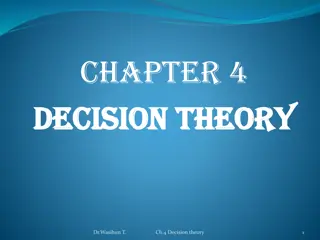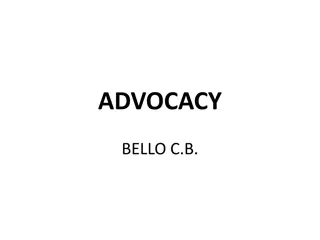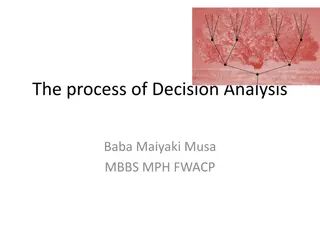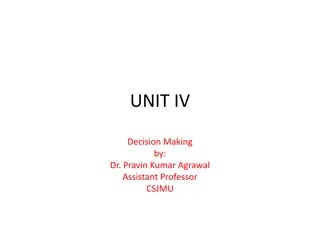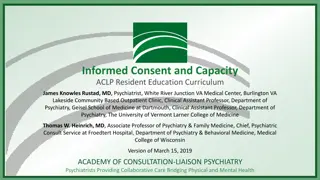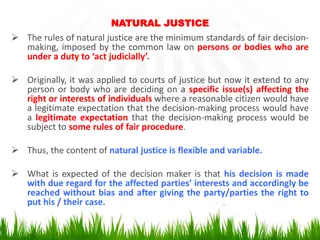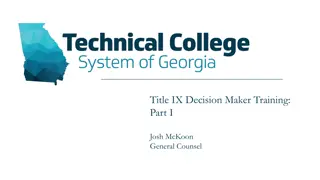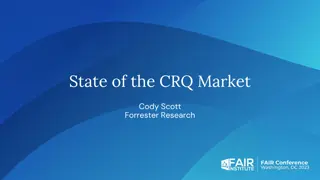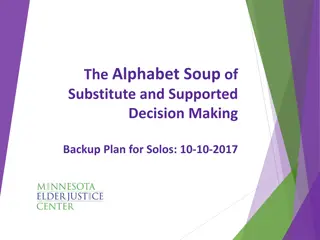Understanding Substitute Decision Makers (SDMs) and Their Role
Substitute Decision Makers (SDMs) play a crucial role in making decisions for individuals incapable of doing so themselves. Different forms of SDMs can be appointed through various legal documents such as powers of attorney and guardianship judgments, each with specific restrictions and authorities. It's important to review the source of authority when SDMs are exercising their decision-making power to ensure compliance and appropriate actions.
Download Presentation

Please find below an Image/Link to download the presentation.
The content on the website is provided AS IS for your information and personal use only. It may not be sold, licensed, or shared on other websites without obtaining consent from the author. Download presentation by click this link. If you encounter any issues during the download, it is possible that the publisher has removed the file from their server.
E N D
Presentation Transcript
What a Substitute Decision Maker Can and Cannot Do
What is a Substitute Decision Maker (SDM)? A substitute decision maker (SDM) may arise from any of the following documents/events/legislation: A power of attorney for property (continuing or not); A power of attorney for personal care; A Judgment appointing a guardian (of property and/or personal care); An assessment resulting in a statutory guardian of property (i.e. the Public Guardian and Trustee); A certificate appointing a substitute statutory guardian of property; The Health Care Consent Act, 1996 [HCCA]
What is a Substitute Decision Maker (SDM)? Each of these SDMs have different restrictions and their authority arises under different circumstances If a judgment, power of attorney or certificate is the source of the SDM s authority, it should always be reviewed when the SDM is exercising his/her authority
What to Look for in a Judgment/Power of Attorney/Certificate 1.Who has the authority to make decisions? Are the SDMs appointed jointly or jointly and severally? Joint SDMs are only authorized to act together Joint and several SDMs may act independently of each other
What to Look for in a Judgment/Power of Attorney/Certificate 2.What decisions are they authorized to make? Does the document give the SDMs authority over property or personal care? Are they limited to specific decisions within those categories (e.g. is the power of attorney only related to a specific institution?) 3.What restrictions are placed on their authority? Is there a time limit to the authority? Does the authority only arise in specific circumstances?
Personal Care SDMs - Attorneys The Substitute Decisions Act, 1992 [SDA] provides a mechanism for individuals to appoint a person to make personal care decisions on their behalf in the event that they are incapable An attorney acting pursuant to a power of attorney for personal care may make decisions relating to: Health care Safety Nutrition Clothing; and Hygiene
Personal Care SDMs Attorneys (continued) An attorney for personal care may only make these decisions once the grantor is found incapable of making those decisions for him/herself
Personal Care SDMs Attorneys - Powers A power of attorney for personal care may contain one or more special provisions if at the time the POA was executed or within 30 days of its execution: the grantor makes a statement in the prescribed form indicating that s/he understood the effect of the provision and that the inclusion of the provision affects the ability of the grantor to revoke the power of attorney without an assessment; and an assessor makes a statement in the prescribed form as to the capacity of the grantor with respect to the provisions
Personal Care SDMs Attorneys - Powers (continued) The special provisions may authorize the attorney to: use reasonable force to determine or confirm the incapacity of the grantor; take/admit/detain/restrain the grantor to any place for care or treatment; and to prevent the grantor from applying to the Consent and Capacity Board to review finding of incapacity Substitute Decisions Act, 1992, section 50
Personal Care SDMs - Guardians If no power of attorney was granted by an incapable person (or where the person in questions asserts that they are capable or the validity of the power of attorney is questioned), a person may apply to a court in Ontario to be appointed the guardian of personal care for that incapable person A guardian of personal care will be appointed for any or all of the areas in which a person is declared incapable (health care, shelter, safety, etc) A guardian of personal care may be appointed with or without restrictions to their authority in each area
Personal Care SDMs - Guardians A guardian of personal care must act in accordance with a guardianship plan, which is approved by the court at the time of their appointment Specific authorization may be provided by the court for the following powers: To apprehend the person; To change existing arrangements in respect of custody of or access to a child, or to give consent on the person s behalf to adopt a child; or To exercise other powers or perform other duties in addition to those set out in the SDA
Personal Care SDMs Guardians - Powers An order appointing a guardian may specifically authorize the following powers: The right to exercise custodial power over the incapable person, determine his or her living arrangements and provide for his or her shelter and safety; The right to instruct a lawyer, settle claims and commence and settle proceedings on the incapable person s behalf, in certain circumstances; The right to have the same access to personal information, including health information and records, that the incapable person could have access to if capable, and the right to consent to the release of that information to another person with some exceptions;
Personal Care SDMs Guardians - Powers The right to make decisions about the incapable person s healthcare, nutrition and hygiene; The right to make decisions about the incapable person s employment, education, training, clothing and recreation and any social services provided to the person; The right to apprehend the person, with the assistance of a police officer, by entering specified premises at specified times Substitute Decisions Act, 1992, section 59 Substitute Decisions Act, 1992, section 59
Personal Care SDMs - Duties All guardians and attorneys must exercise their duties diligently and in good faith They must also make decisions on the incapable person s behalf in accordance with the HCCA and, where the HCCA does not apply, in accordance with the following principles: If the SDM knows of a wish or instruction applicable to the circumstances that the incapable person expressed while capable, the guardian shall make the decision in accordance with the wish or instruction;
Personal Care SDMs - Duties (continued) The SDM shall use reasonable diligence in ascertaining whether there are such wishes or instructions; A later wish or instruction expressed while capable prevails over an earlier wish or instruction; If the SDM does not know of a wish or instruction applicable to the circumstances that the incapable person expressed while capable, or if it is impossible to make the decision in accordance with the wish or instruction, the SDM shall make the decision in the incapable person s best interests (taking into account their values and beliefs, current wishes, etc)
Personal Care SDMs - Restrictions The law limits or restricts a guardian s and attorney s authority to make decisions with respect to sterilization and regenerative tissue donation: Sterilization may only be consented to if it is therapeutic (i.e. medically necessary) for the incapable person (E v Eve, [1986] 2 SCR 388); The Human Tissue Donation Act requires that a person donating (regenerative or non-regenerative) tissue understand the nature and consequences of transplanting tissue from his or her body during his or her lifetime, unless an independent assessment is performed
Personal Care SDMs Restrictions (continued) An SDM shall not use confinement or monitoring devices to restrain an incapable person physically or by means of drugs, and shall not give consent on the person s behalf to the use of confinement, monitoring devices or means of restraint, unless The practice is essential to prevent serious bodily harm to the person or to others; or Allows the person greater freedom or enjoyment
Personal Care SDMs Restrictions (continued) An SDM shall not use electric shock as aversive conditioning and shall not give consent on the person s behalf to the use of electric shock as aversive conditioning unless the consent is given to a treatment in accordance with the HCCA
Personal Care SDMs - HCCA The HCCA includes a mechanism for an SDM to provide consent to an incapable person s treatment, admission to a long-term care facility or personal assistance services (if a person is already residing in long-term care): The incapable person s guardian of the person; The incapable person s attorney for personal care; The incapable person s representative appointed by the Consent and Capacity Board under section 33; The incapable person s spouse or partner; Any other relative of the incapable person A child or parent of the incapable person; A parent of the incapable person who only has a right of access; A brother or sister of the incapable person; Any other relative of the incapable person
Personal Care SDMs HCCA (continued) If no person described above can act as SDM on the incapable person s behalf, or where a conflict arises between two or more persons equally ranked by the HCCA, the Public Guardian and Trustee shall make the decision to give or refuse consent The guidelines for giving or refusing consent under the HCCA are extremely similar to those outlined under the SDA (see HCCA, s 21)
Personal Care SDMs Living Wills/Advance Directives An incapable person may, during a period during which they were capable, prepare what is often referred to as a living will If a living will exists, it is an expression of the incapable person s wishes while they were capable, and is therefore binding on substitute decision makers in respect of the decisions they must make on behalf of the incapable person A living will has no prescribed form but the SDM should consult it if one exists
Property SDMs Attorneys The SDA provides a mechanism for individuals to appoint a person to make decisions on their behalf with respect to their property in the event that they are incapable A power of attorney may be effective as of the date it is granted or it may be a springing power of attorney (effective as of a certain trigger event or date)
Property SDMs Attorneys (continued) If a person grants a power of attorney that is effective immediately, the attorney to which it is granted has the authority to act even if the grantor is capable An attorney always has a fiduciary duty to the grantor to act in accordance with known wishes and in the best interests of the grantor If the power of attorney is a continuing power of attorney, it remains effective during any subsequent period of incapacity on the part of the grantor
Property SDMs - Guardians Unlike for personal care, there is no statute setting out who shall make decisions with respect to an incapable person s property in the event that they have not granted a power of attorney for property In this case, a guardian of property may arise in the following ways: The person may be assessed pursuant to section 16 of the SDA, and, if found incapable, the PGT shall become the statutory guardian of property for the person; A person may then apply to the PGT to replace the PGT as statutory guardian;
Property SDMs Guardians (continued) A person may apply to the court, providing evidence of the subject s incapacity to manage property, to be appointed as the guardian of property for the alleged incapable person Unlike statutory guardianship, this is an option even if there is an existing power of attorney for property
Property SDMs - Duties The SDM has the power to do on the incapable person s behalf anything in respect of property that the person could do if capable, except make a will The SDM is a fiduciary whose powers and duties shall be exercised and performed diligently, with honesty and integrity and in good faith, for the incapable person s benefit If the SDM s decision will have an effect on the incapable person s personal comfort or well-being, the SDM shall consider that effect to determine whether the decision is for the incapable person s benefit
Property SDMs Duties (continued) The SDM shall manage a person s property in a manner consistent with decisions concerning the person s personal care that are made by the person who has authority to make those decisions, UNLESS the adverse consequences of a decision concerning the person s property significantly outweighs the benefits in respect of the person s personal care The SDM shall explain to the incapable person what his/her powers and duties are
Property SDMs - Duties The SDM shall encourage the incapable person to participate, to the best of his or her abilities, in the SDM s decisions about the property The SDM shall seek to foster regular personal contact between the incapable person and supportive family members and friends of the incapable person The SDM shall consult from time to time with: Supportive family members and friends of the incapable person who are in regular contact with the incapable person; and The persons from whom the incapable person receives personal care.
Property SDMs Duties (continued) The SDM shall keep accounts of all transactions involving the property An SDM shall make the following expenditures from the incapable person s property, in the order in which they are possible to maintain sufficient funds for the subsequent expenditures: Those that are reasonable necessary for the person s support, education and care; Those that are reasonably necessary for the support, education and care of the person s dependants; Those that are necessary to satisfy the person s other legal obligations
Property SDMs Duties (continued) The value of the property, the accustomed standard of living of the incapable person and his or her dependants and the nature of other legal obligations must be taken into account when making the above expenditures
Property SDMs Powers An SDM may make gifts or loans to the person s friends and relatives or charitable gifts, if: The property will remain sufficient for the mandatory expenditures of the incapable person; The gifts/loans are consistent with the capable wishes of the incapable person; The incapable person has not expressed a contrary wish to make such gifts; The value of the charitable gifts does not exceed the lesser of 20% of the income of the property in the year in which the gifts are made and the maximum amount of charitable gifts provided for in a valid power of attorney (unless approved by the court).
Property SDMs Powers (continued) An SDM may apply to the court for directions relating to the guardianship or power of attorney of an incapable person An SDM is entitled to compensation, subject to any restrictions in the document granting their authority. The regulated compensation of a guardian or attorney for property is 3% of all receipts and disbursements, as well as a care and management fee in the amount of 3/5 of 1% of the annual average value of the assets. Compensation is always subject to review by the courts and specific standards of care apply to guardians and attorneys taking compensation as opposed to those who do not take compensation
Property SDMS - Restrictions A power of attorney or an order appointing a guardian (or in the event that a guardian replaces the PGT as statutory guardianship, a certificate of appointment under section 17(8) of the SDA) may restrict the authority of the attorney or guardian of property A guardian, whether court-appointed or statutory, unless the statutory guardian is the PGT, shall act in accordance with a management plan approved by the PGT or the Court A guardianship may be time-limited or may have other conditions restricting the authority of the guardian
Takeaways ALWAYS ask to see the document providing the SDM with authority Review the document for: Specific powers granted to the SDM; Restrictions of the SDM s authority, including: Time limits (temporary guardianships, springing POAs); Reporting requirements (consent required from court, PGT or Office of the Children s Lawyer); Scope of authority (permitted to act alone? For this specific decision?) Consider applying to the Consent and Capacity Board for clarification with respect to personal care decisions






